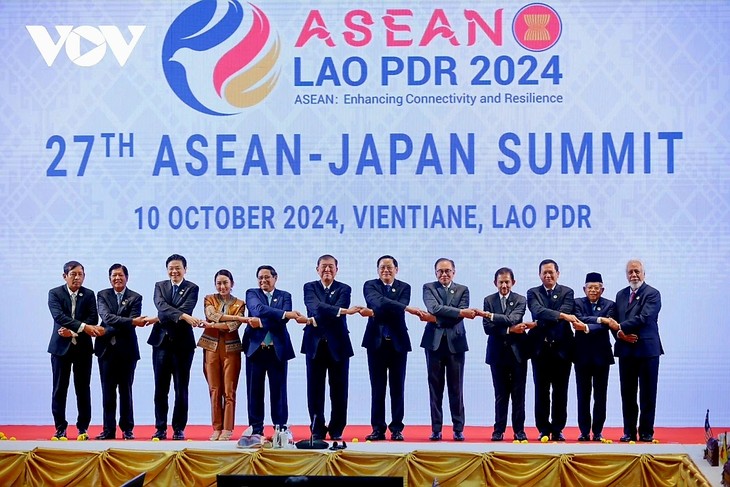(VOVWORLD) -As part of the ASEAN Summits and related meetings in Vientiane, Laos, on Thursday, Prime Minister Pham Minh Chinh attended the ASEAN-Japan Summit, ASEAN+3 Summit, ASEAN-Australia Summit, ASEAN-India Summit and ASEAN-Canada Special Summit.
 The 27th ASEAN-Japan Summit. Photo: VOV The 27th ASEAN-Japan Summit. Photo: VOV
|
At the 27th ASEAN-Japan Summit, PM Chinh stressed that economic, trade, and investment cooperation should remain the key impetus in bilateral ties. He encouraged Japanese businesses to invest more in ASEAN and called on the Northeast Asian nation to increase assistance for ASEAN firms to engage in its businesses’ supply chains, develop supporting industries, and nurture skilled workforce. Besides, the Vietnamese PM stressed the need to promote new growth drivers which are emerging areas such as digital transformation, semiconductors, cloud computing, Internet of Things, energy transition, green economy, circular economy, and smart agriculture.
Addressing the 27th ASEAN Plus Three Summit, PM Chinh outlined three key orientations for ASEAN Plus Three cooperation, including ensuring the connectivity of supply chains; leveraging new growth drivers like innovation, digital transformation, green transition, circular economy, sharing economy, and emerging sectors like artificial intelligence, semiconductor, cloud computing, and Internet of Things; and enhancing resilience against natural disasters and climate change.
At the 4th ASEAN-Australia Summit, PM Chinh called on ASEAN and Australia to continue working closely to build their future-oriented comprehensive strategic partnership. The PM underscored the need for both sides to coordinate with each other to create breakthroughs in economic, trade, and investment cooperation, and strongly promote new growth drivers such as science and technology, innovation, and digital transformation. PM Chinh called on ASEAN and Australia to mutually support each another in successfully realizing the sustainable development goals by expanding their cooperation in areas such as energy transition, green transition, environmental protection, emissions reduction, and climate change response.
At the 21st ASEAN-India Summit, PM Chinh emphasized that ASEAN and India need to make breakthrough progress in economic, trade, and investment ties. He also asked for expanding partnerships in science, technology, and innovation, particularly in such fields as core technology, semiconductor, digital economy, and training of high-quality human resources related to cloud computing, Internet of Things, and artificial intelligence. The PM suggested India continue cooperation and assistance for the effective implementation of the Mekong - Ganga cooperation framework. Concluding the summit, participating leaders adopted a statement on enhancing the ASEAN - India Comprehensive Strategic Partnership for regional peace, stability and prosperity, along with a joint statement on promoting digital transformation.
At the ASEAN-Canada Special Summit on Enhancing ASEAN Connectivity and Resilience, PM Chinh said ASEAN and Canada need to prioritize enhancing trade and investment connectivity, complete negotiations on the ASEAN-Canada Free Trade Agreement in 2025. He suggested Canada step up cooperation to improve resilience to climate change challenges, support ASEAN countries, especially the Mekong sub-region, in energy transition, environmental protection, natural disaster management, climate change response, emissions reduction, and sustainable development. In addition, Canada should also participate in supporting ASEAN to further promote the development of digital economy, green economy, circular economy, and cybersecurity. At the end of the summit, the leaders of ASEAN countries and Canada agreed to adopt a Joint Statement on Enhancing ASEAN Connectivity and Resilience.
At the summits, the Vietnamese Prime Minister emphasized the importance of respecting and upholding international law, the United Nations Charter, and the 1982 UNCLOS, as well as frank dialogue, sincere cooperation, mutual trust and respect, resolving all disputes by peaceful means, joining hands to respond to global challenges, and jointly shaping an open, inclusive, and transparent regional structure.